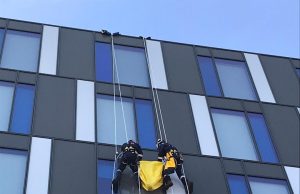
With so many businesses using forklift trucks, and the accident levels rising, forklift truck training is essential. Find out why, below.
Forklifts are essential tools in the modern economy. They allow for the easy movement and storage of materials and products. If utilised well, they can be the most valuable piece of equipment in the working area. Unfortunately, this valuable tool can also be dangerous and can cause fatal accidents to both the user and any other bystander. Forklift accidents result in loss of life, injuries and damage to property. The accidents occur due to driver’s error and so it is necessary that greater emphasis is placed on forklift truck training to reduce mishaps.
It is true that there are many companies out there that purchase these machines and deploy them without considering untrained individuals may be using them. Thus, it is vital that the men and women who operate these machines to undergo proper forklift truck training before they are allowed to use them to help reduce incidents of accidents. UK law requires that they become certified before they are allowed to operate the machinery.
Accident Statistics
According to the latest statistics, forklifts are ranked highly amongst the most dangerous forms of workplace transport. They injure more people than large goods vehicles. About 1,300 employees are hospitalised annually in the UK alone with serious injuries caused by accidents involving forklifts. Most of them suffer from life-changing injuries including dislocations, amputations, degloving and complex fractures. The pedestrians are not spared either. 57 % of them are killed or injured in forklift-related accidents. Consequently, there is a need to segregate between pedestrian areas and loading bays where forklifts are used on a regular basis. This brings us to elements of forklift safety.
Safety Elements
According to EU Osha Standards, it is mandatory that forklift training programs include both formal and practical training. It should include the performance at the workplace and evaluation. Consequently, it requires that operators should always inspect, check out the brakes, the horns, the lights, tires, seat belts, backup alarms, loading parts, fluid levels and back up alarms of their machines before operating them to guarantee their safety and that of bystanders.
Also, while driving the forklifts, it is important for them to adhere to all traffic laws including speed limitations and should never engage in games that could result in accidents. The following are the most important safety elements that must be considered.

- Training for Safety
Employers should ensure that workers are properly trained before they are allowed to operate forklifts. This is mandatory since it helps to reduce accidents caused by the careless manoeuvres of forklifts. It reduces the risk of injuries and forklift-related deaths. Note that untrained forklift driver is as dangerous as an unlicensed motor vehicle driver. Therefore, it is the duty of the employer to ensure that the driver is trained and is competent to operate the machinery in accordance with the UK laws.
The training programs must include both formal instructions that are delivered in the form of lectures, written materials and practical training that includes workplace performance evaluation. The trainers should also take into consideration the differences between different models and types of forklifts.
- Check-ups
Operators are required to perform regular check-ups including inspecting the forklifts before they actually start using them to load or to offload. Seat belts, brakes, fluid levels, tires, horn, lights and moving parts must be checked to ensure that they are functional. Also, companies must employ forklift inspectors whose job is to inspect the machinery regularly to ensure that they are in a good working condition. Just like drivers, the inspectors must also undergo forklift truck training to equip them with relevant skills to help them advise employers on how best they can comply with the requirements. They should keep them updated on methods they can use to resolve emerging issues as they continue to utilise forklifts in their companies.
- Understanding the Machinery
It is critical that both forklift drivers and company workers get equipped with basic knowledge about forklifts to help promote personal safety at the workplace or anywhere where the forklifts are used. Among the things that should be brought to their attention are:
- Weight issues – how much weight the forklift should be allowed to handle.
- Travelling speed- the speed that a forklift operator should drive when at the loading bay or on road.
- Stability issues- the drivers must be aware of tipping overs whether the forklift is loaded or not.
- Turning radius – they should be made to understand the turning radius when operating in tight spots and when in areas with ample space.
- The Driver’s Responsibilities
The forklift operator must ensure that they wear a seat belt to reduce the risk of being ejected from their protective cage when it tilts resulting in injuries or even death.
The operators must always be aware of his surrounding while operating the machinery because it is possible that the environment or the load could easily obstruct visibility.
They should always keep a clear view of the load and the environment.
The driver should focus their eyes in the direction of travel. Aids and spotters such as rear mirrors should be working and must be used to aid visibility. Also, the driver must ensure that the forklift has working headlights and should switch them on when working in areas that are poorly illuminated.
Load basics – the driver must always inspect the load before picking them. In fact, forklift truck training programs are tailored to help operators understand the load stability concept. They are taught how to balance the load and the point at which they can start driving the truck when it is under the load. It is recommended that they should check areas where they need to place the load beforehand and ensure that they are flat and stable.
Finally, forklift truck drivers must take precautions to guarantee their safety and that of their workmates. They must understand the hazards that they face and should undergo forklift truck training to prepare them to handle the machinery. If this is done in accordance with the law, it helps to reduce forklift-related accidents and makes working on this machinery enjoyable.













